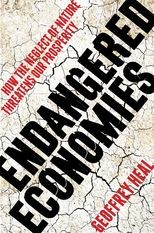Endangered Economies: How the Neglect of Nature Threatens Our Prosperity
Endangered Economies: How the Neglect of Nature Threatens Our Prosperity
Cite
Abstract
In the decades since Geoffrey Heal began his field-defining work in environmental economics, one central question has animated his research: "Can we save our environment and grow our economy?" This issue has become only more urgent in recent years with the threat of climate change, the accelerating loss of ecosystems, and the rapid industrialization of the developing world. Reflecting on a lifetime of experience not only as a leading voice in the field, but as a green entrepreneur, activist, and advisor to governments and global organizations, Heal clearly and passionately demonstrates that the only way to achieve long-term economic growth is to protect our environment. Writing both to those conversant in economics and to those encountering these ideas for the first time, Heal begins with familiar concepts, like the tragedy of the commons and unregulated pollution, to demonstrate the underlying tensions that have compromised our planet, damaging and in many cases devastating our natural world. Such destruction has dire consequences not only for us and the environment but also for businesses, which often vastly underestimate their reliance on unpriced natural benefits like pollination, the water cycle, marine and forest ecosystems, and more. After painting a stark and unsettling picture of our current quandary, Heal outlines simple solutions that have already proven effective in conserving nature and boosting economic growth. In order to ensure a prosperous future for humanity, we must understand how environment and economy interact and how they can work in harmony—lest we permanently harm both.
-
Front Matter
- 1 Environment and Economy—No Conflict
-
2
Market Mistakes and How Unpaid-For External Effects Are Killing Us
- 3 Climate Change—“The Greatest External Effect in Human History”
-
4
How to Deal with External Effects
-
5
Solving the Climate Problem
-
6
Everyone’s Property is No One’s Property
-
7
Natural Capital—Taken for Granted but Not Counted
-
8
Valuing Natural Capital
-
9
Measuring What Matters
-
10
The Next Steps
-
End Matter
Sign in
Personal account
- Sign in with email/username & password
- Get email alerts
- Save searches
- Purchase content
- Activate your purchase/trial code
Institutional access
-
Sign in through your institution
- Sign in with a library card Sign in with username/password Recommend to your librarian
Institutional account management
Sign in as administratorPurchase
Our books are available by subscription or purchase to libraries and institutions.
Purchasing information| Month: | Total Views: |
|---|---|
| November 2022 | 1 |
| November 2022 | 1 |
| April 2023 | 4 |
| April 2023 | 3 |
| April 2023 | 1 |
| June 2023 | 2 |



Get help with access
Institutional access
Access to content on Oxford Academic is often provided through institutional subscriptions and purchases. If you are a member of an institution with an active account, you may be able to access content in one of the following ways:
IP based access
Typically, access is provided across an institutional network to a range of IP addresses. This authentication occurs automatically, and it is not possible to sign out of an IP authenticated account.
Sign in through your institution
Choose this option to get remote access when outside your institution. Shibboleth/Open Athens technology is used to provide single sign-on between your institution’s website and Oxford Academic.
If your institution is not listed or you cannot sign in to your institution’s website, please contact your librarian or administrator.
Sign in with a library card
Enter your library card number to sign in. If you cannot sign in, please contact your librarian.
Society Members
Society member access to a journal is achieved in one of the following ways:
Sign in through society site
Many societies offer single sign-on between the society website and Oxford Academic. If you see ‘Sign in through society site’ in the sign in pane within a journal:
If you do not have a society account or have forgotten your username or password, please contact your society.
Sign in using a personal account
Some societies use Oxford Academic personal accounts to provide access to their members. See below.
Personal account
A personal account can be used to get email alerts, save searches, purchase content, and activate subscriptions.
Some societies use Oxford Academic personal accounts to provide access to their members.
Viewing your signed in accounts
Click the account icon in the top right to:
Signed in but can't access content
Oxford Academic is home to a wide variety of products. The institutional subscription may not cover the content that you are trying to access. If you believe you should have access to that content, please contact your librarian.
Institutional account management
For librarians and administrators, your personal account also provides access to institutional account management. Here you will find options to view and activate subscriptions, manage institutional settings and access options, access usage statistics, and more.